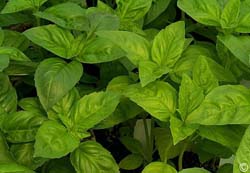 Herbs can add flavor to culinary dishes and beverages, be used for fragrance or their medicinal properties, or they can be enjoyed for their ornamental value. Many a homemaker has grown a pot of basil or a carpet of thyme outside the kitchen door, where with a quick snip, they can pump up the flavor of a meal.
Herbs can add flavor to culinary dishes and beverages, be used for fragrance or their medicinal properties, or they can be enjoyed for their ornamental value. Many a homemaker has grown a pot of basil or a carpet of thyme outside the kitchen door, where with a quick snip, they can pump up the flavor of a meal.
Where can I grow herbs?
Herbs can be grown in containers, planted among flowers or vegetables or in a dedicated herb garden. When considering where to plant herbs look for a spot that receives plenty of sunshine and has well-drained soil. Many herbs are native to the Mediterranean region and thrive in an environment that is similar.
What soil should I use for my herbs?
Heavy clay soils as well as sandy soils will benefit from the addition of organic material to the planting bed prior to planting herbs. Compost incorporated into clayey soil will improve drainage and aeration, and in sandy soil compost will improve water retention.
Should I fertilize my herbs?
In general herbs require little or no supplemental fertilization if the soil has adequate organic matter. While extra fertilizer encourages foliar growth, the leaves often do not have the distinct flavor for which the plant is grown.
How much should I water my herbs?
Supplemental water is needed for most herbs. When watered they should be watered thoroughly as numerous light sprinklings encourages roots to stay near the surface of the soil where they will dry out faster. Plants grown in containers need more water than those grown in-ground. This frequent watering will leach nutrients from the planting medium so containerized herbs will require a dose of fertilizer periodically.
What should I consider when picking herbs to plant?
With dozens of herbs available for the garden, the choice of what to plant is a very personal one. A quick glance at the spice rack can be an inspiration. A word of caution regarding mints: they are aggressive growers, and it is recommended that mints be grown in a container or in an area that has boundaries. Herbs often grown for culinary purposes include basil, chives, dill, fennel, oregano, parsley, rosemary, sage and thyme. Many of these same plants are grown for their fragrance and their ornamental value.
For more information, see the following Planttalk Colorado™ video(s).
For more information on herbs and their culture please refer to the following references:



